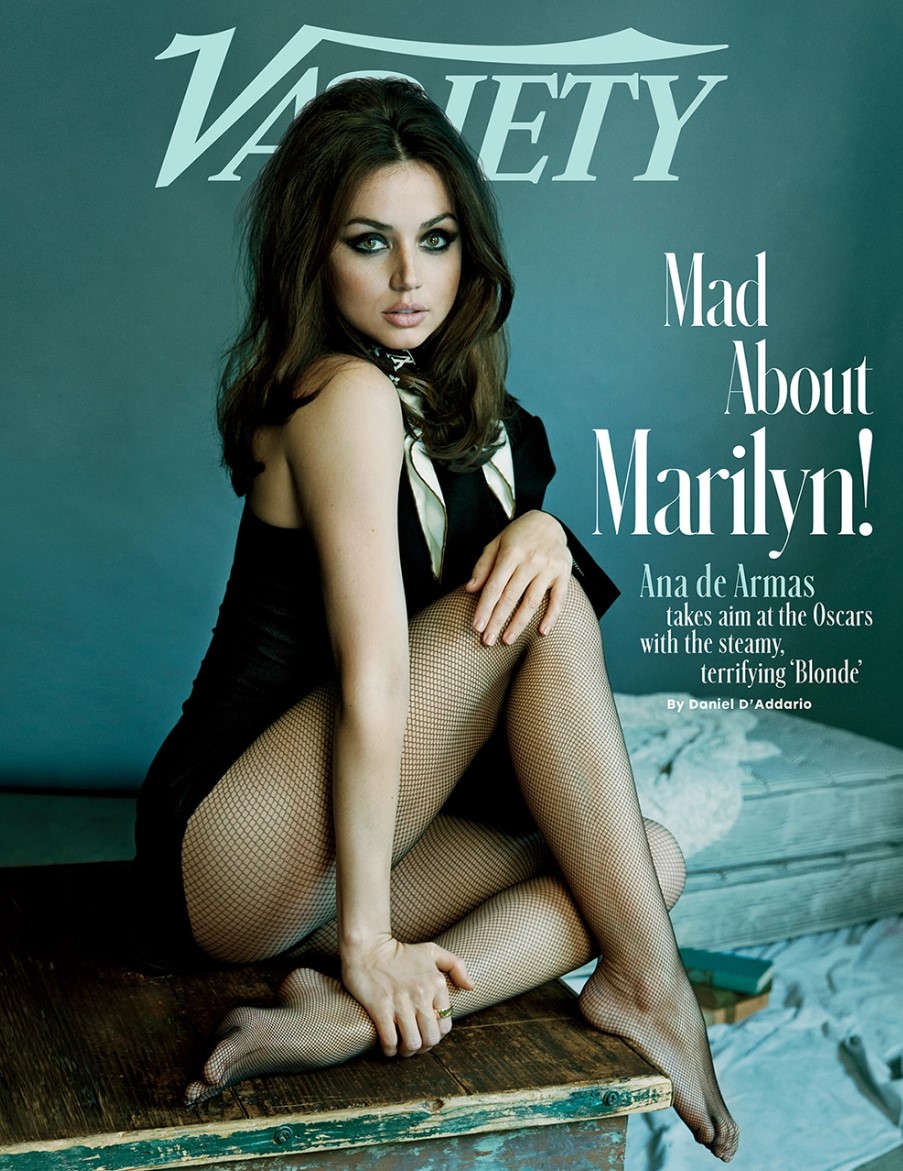Ana de Armas sets her narrative



Blonde, the quasi-biopic of Marilyn Monroe starring Ana de Armas, is in limited theatrical release now, but it hits Netflix next week, which is when Blonde-mania will crest. It’s also when Ana de Armas will launch into the forefront of the Best Actress Oscar race, as she will get all the headlines for at least a solid week. Sure, she had headlines coming out of Venice, but she had to share space with Cate Blanchett and Michelle Williams and Michelle Yeoh, who was honored at TIFF and is trying for the feel-good nomination of the year. But next week is Blonde week, it’s Marilyn’s week, it’s Ana’s week with nothing and no one to challenge her (except for Billy Eichner’s rom-com, Bros, which opens in theaters two days after Blonde drops on Netflix).
De Armas is getting her campaign ducks in a row, starting with a lengthy profile in Variety that cements the Blonde timeline—it began filming three years ago, pre-pandemic—and the narrative of de Armas mastering Marilyn’s distinctive voice through her Cuban accent, and embodying the iconic actress through various “degradations” on screen. That word comes up a couple times in the profile, “degradation”. Put a pin in that, we’ll come back to it later in my full review of Blonde. For now, let’s focus on de Armas owning her sex scenes, that NC-17 rating—honestly, the film is NOT that explicit, Netflix probably could have appealed the rating and gotten it down to an R, but I bet they chose the free publicity NC-17 offers instead—and knowing her naked body will be GIF’ed into oblivion once Blonde is online.
“I know what’s going to go viral […] and it’s disgusting. It’s upsetting just to think about it. I can’t control it; you can’t really control what they do and how they take things out of context. I don’t think it gave me second thoughts; it just gave me a bad taste to think about the future of those clips,” she says, and she’s right. She can’t control it, just like no one can control the inevitable and epic irony of people exploiting de Armas’s body in a film explicitly about the exploitation of a famous beauty.
Blonde was meant to come out in 2020, on the heels of her breakout Knives Out success and in a one-two punch with her scene-stealing performance in No Time To Die, but there were COVID delays, and Netflix fretted about director Andrew Dominik’s long and explicit cut of the film. (But wait, I thought Netflix gave no notes? Are you suggesting that has been overstated? No, say it ain’t so!) Writer Daniel D’Addario points out Blonde was made before Netflix’s stock freefall and reassessment, back when they regularly handed blank checks to auteurs like Dominik to make whatever they wanted to bring prestige and, hopefully, trophies to the streamer. In that way, Blonde is a relic of another time, maybe the last really risky film we’ll see from Netflix for a while.
Tied to that is the idea that de Armas was a risky hire, mainly because English is her second language, and even with nine months of coaching, she can’t cover her natural accent. Honestly, it’s not a problem for the film at all, and I expect once the film is widely available, the subject of de Armas’s accent will largely be dropped. But here it’s a main feature, including an anecdote about her vocal coach feeding her pronunciations during her screen test from under a table. It’s a little bit of a strange narrative emerging for de Armas here, as on the one hand, they want to emphasize the work she put in, and her dedication to her craft, in general, and Marilyn, specifically. But at the same time, Dominik is big on the idea of de Armas as fated to play Marilyn, and the profile leans into the tabloid similarities, of both women having high-profile relationships and being targeted by photographers.
In the long run, that might serve de Armas better than the accent stuff. Because of COVID delays and shutdowns, Blonde didn’t complete production until mid-2021, after de Armas split with Dunkin Donuts fan Ben Affleck. So her Marilyn days overlapped with experiencing her own exploited romance. I’m not saying she needs to spill the beans about that relationship—though we’ll listen if you want to, Ana!—but tying her own experience with tabloid exploitation to Marilyn’s similar experiences, now that’s a narrative. And it will be easier for the sexually conservative Academy to process than opening up conversations about exploitation of actors’ bodies online and how Marilyn was similarly exploited in print media. That’s a conversation well worth having, but it’s too complex and nuanced for awards season. Ana de Armas processing her own tabloid frenzy while portraying Marilyn Monroe is a much cleaner narrative.

